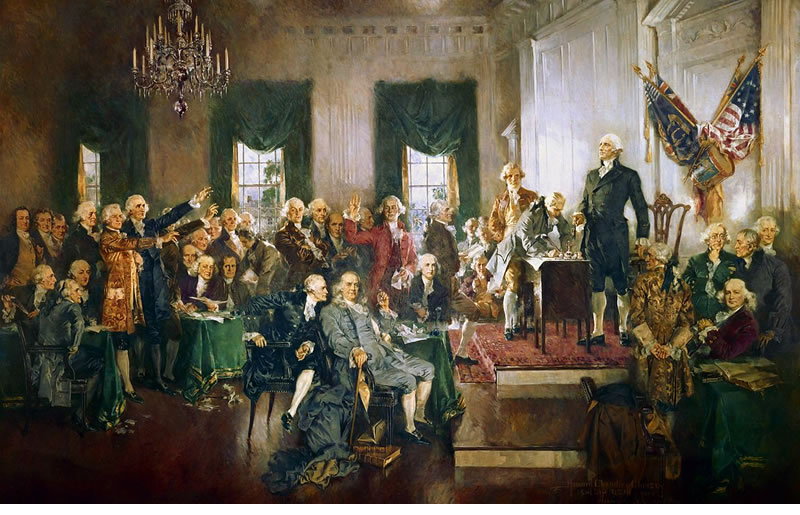Scene at the Signing of the Constitution of the United States, a painting by Howard Chandler Christy. In the center is Benjamin Franklin (seated). Alexander Hamilton, also seated in blue, appears to be whispering in his ear. George Washington is standing by the desk. To identify other signers, click here.
By Elliott Brack, editor and publisher | Here at the end of the year, let’s air some thoughts squirreled away.
 FOUNDING FATHERS: You hear all sorts of references to our “founding fathers.” Many were relatively young, that is, under 40 in 1776.
FOUNDING FATHERS: You hear all sorts of references to our “founding fathers.” Many were relatively young, that is, under 40 in 1776.
But did you ever stop to realize just how young these people we venerate as our founders of this country really were? It might surprise you.
James Monroe was 18; Aaron Burr was 20; Alexander Hamilton was 21; James Madison was 25. And one of the heroes of the Revolution, Count Marquis La Fayette? He was 18.
More: Henry Lee III was 20; John Marshall, 20; Nathan Hale, 21; Gouveneur Morris was 24; Henry Knox was 25; Georgia’s George Walton was 27; John Jay was 30; Nathanael Greene and Thomas Jefferson were 33; John Hancock was 39, as was Thomas Paine, while Patrick Henry and John Adams were old guys at 40. (Our own Button Gwinnett was 41. Dr. Lyman Hall of Georgia was 52.)
And George Washington was 44.
So all of our many references to “founding fathers” isn’t to a bunch of old men sitting around and contributing their many years of experience to producing amazing, far-reaching and powerful documents for the future of the world. Most of it came from a bunch of relatively young guys, who must have been smart as a whip. It might help put the discussion of “founding fathers” in a new light.
The oldest: Samuel Whittemore was 81, and Benjamin Franklin was 70. By the way, Whittemore was a Massachusetts farmer who was known as the oldest known colonial combatant in the American Revolutionary War.
Credit: Most of this comes from the Journal of the American Revolution.
MYSTERY WRITERS ought to have a heyday with new-age technology for extinguishing a human body. After all, no finer writer than Agatha Christie came up with these ways of croaking someone:
strangled by a raincoat belt and a ukulele; stabbed with a corn knife; jabbed with a venom-tipped dart; drowned in an apple tub; crushed by a bear-shaped marble clock; and electrocuted by a chessboard rigged to deliver the fatal charge upon completion of the third move of the Ruy Lopez opening, which is Bb5.
But it will take real creativity to top some of her methods!
MANY LAMENT the elimination of one subject no longer taught at the high school level: civics. These days many high school and college graduates just never get around to studying and understanding government in general, which was previously taught in civics classes. We presume some educational scholars thought other subjects were more important.
Alas! Lack of understanding the working of government is going to haunt us for years. Some say it already is one of our major reasons all too many people take so little interest in government. Unfortunately, many of these people vote. Hence, our dilemma.
Then there is another subject that students get too little of these days: ethics. Though not directly taught earlier in our schooling, somehow we remember teachers of old who instilled in their students an understanding of ethical considerations. Perhaps they sprinkled ethics into routine observations when teaching varied subjects.
Many of our ethical considerations came from what we learned in church and in Sunday School. Perhaps the lesser importance that many people give to churchly affairs has an impact on our ethical considerations today. After all, we reap what we sow.
- Have a comment? Send to: elliott@brack.net










Follow Us